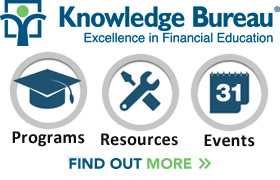
Immediate Expensing Rules: Good Tax Policy?
Over the course of the last two federal budgets (April 16, 2024 and November 4, 2025), the rules for claiming Capital Cost Allowance (CCA) have been uncertain. The proposal to extend immediate expensing rules for certain acquired assets were paused for over a year and then re-introduced in a series of four complex measures which together with new rules for Scientific Research and Experimental Development have become known as the “Productivity Super-Deduction”. A backdrop appears below. The key question: will this complexity be effective as an economic stimulator?Business Competitiveness: Understanding the Tax in Post- Pandemic
 Knowledge Bureau Report asked Marco Iampieri, Of Iampieri Law Professional Corporation, to review a new paper on small business tax competitiveness by Dr. Jack Mintz, who spoke recently at the Distinguished Advisor Conference (DAC), Patrick Smith and V. Balaji Venkatachalam. It’s an important paper for its time, as the small business in Canada attempts to leave the pandemic behind in 2021.
Knowledge Bureau Report asked Marco Iampieri, Of Iampieri Law Professional Corporation, to review a new paper on small business tax competitiveness by Dr. Jack Mintz, who spoke recently at the Distinguished Advisor Conference (DAC), Patrick Smith and V. Balaji Venkatachalam. It’s an important paper for its time, as the small business in Canada attempts to leave the pandemic behind in 2021.
New Course: Privacy Principles in Business
 New Course: Privacy Principles in Business
Privacy of confidential financial data is an important issue to your clients and no wonder: Statistics Canada says that about 57% of Canadians online reported experiencing a security incident in 2018. Do you know how to avoid privacy risks that may arise in your business?
New Course: Privacy Principles in Business
Privacy of confidential financial data is an important issue to your clients and no wonder: Statistics Canada says that about 57% of Canadians online reported experiencing a security incident in 2018. Do you know how to avoid privacy risks that may arise in your business?
How Much is Enough
 How much is enough? Winning Advisors: Grit, Determination and Exhilaration
Tony Mahabir, Tony Mahabir, CEO Canfin Financial Group of Companies, introduced delegates to the Japanese concept of Ikigai which focuses on Life Purpose at the DAC 2021. It all began with a thought-provoking message: “Are we too concerned with earning money and not living the good life?” he asked.
How much is enough? Winning Advisors: Grit, Determination and Exhilaration
Tony Mahabir, Tony Mahabir, CEO Canfin Financial Group of Companies, introduced delegates to the Japanese concept of Ikigai which focuses on Life Purpose at the DAC 2021. It all began with a thought-provoking message: “Are we too concerned with earning money and not living the good life?” he asked.
Be the Best you can Be and Be Recognized for it!
 Evelyn Jacks was pleased to introduce Lewis Kent, this year’s New Advisor Award winner at the Distinguished Advisor Conference 2021. His incredible and inspirational story, below. And yes, the search is on for the 2022 winner, who will win a free registration and main stage speaking opportunity at DAC 2022 in Niagara Falls October 16-18. Check out Lewis’ amazing story:
Evelyn Jacks was pleased to introduce Lewis Kent, this year’s New Advisor Award winner at the Distinguished Advisor Conference 2021. His incredible and inspirational story, below. And yes, the search is on for the 2022 winner, who will win a free registration and main stage speaking opportunity at DAC 2022 in Niagara Falls October 16-18. Check out Lewis’ amazing story:



